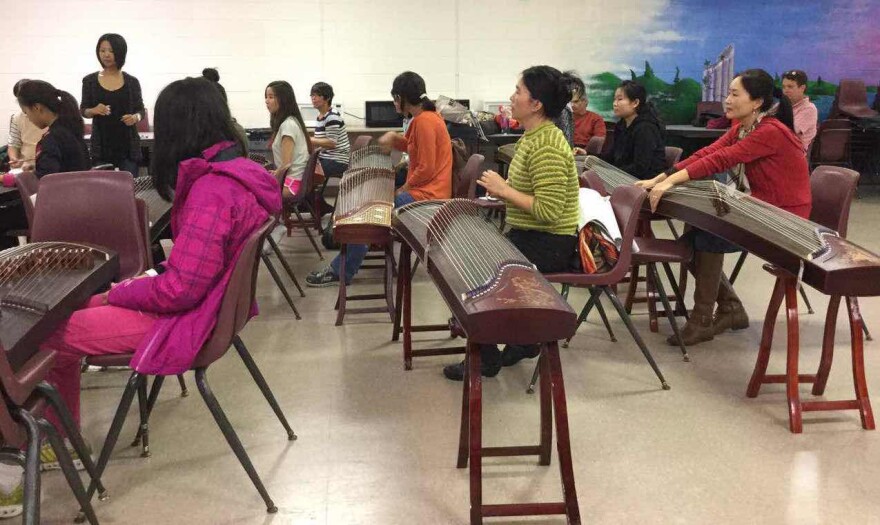She has three names.
Xiaodan Liang, 42, was born in China, where she spent the first 39 years of her life. She received her American name, Danielle Hernacki, after she came to the U.S. in December 2013 and married her husband. To many of her students, she is often called by her stage name, Wu Xianzi, which means “the person who dances on the strings".
Liang is a gu zheng teacher at Hua-Gen Chinese school in Gainesville. Gu zheng is known as a traditional Chinese zither. The modern version of gu zheng has 21 strings and is tuned in D flat.
Liang teaches five students under the age of 18 and six students over 18 in two separate classes every Saturday afternoon for one hour.
“I do not want to teach too many students in a class because I have to ensure the quality of my teaching,” she said.
Liang learned how to play the gu zheng when she was 15 years old and taught it for more than 20 years in China before coming to the U.S. The sound of it attracted her - as it has for the students she teaches.
She had taught five American students so far, and all her students said they decided to learn gu zheng because of its unique sound.
“People would love to learn more about gu zheng after they listen to it,” she said. “It is just a matter of whether they know gu zheng, and that was why I want more people to know about it.”
In order to teach students who do not have a gu zheng, she contacts the companies she is familiar with to buy more than 30 high-quality gu zhengs at a time for a reasonable price and sells them to students.
She said because the companies allow her to buy gu zhengs at a discount, and because she knows which companies are good, students do not have to pay as much as they would online.
Qin Zhao, 45, from Chengdu, China, has been learning to play the gu zheng from Liang at Hua-Gen Chinese School for over a year.
Even though Zhao was not confident when she started to learn the gu zheng, she said Liang would always encourage her to make sure she would be comfortable playing it.
“Everyone knows Liang is a responsible teacher,” she said. “She would call students if they are late to ask whether they would come, and she would wait for them if necessary.”
Besides working at the school, Liang has more than 130 students she teaches online for free on Saturday morning using an instant messaging software called Tencent QQ.
She said about 20 students are in China, and the others are spread all over the U.S.
During the one-hour online class, Liang shows her students how to play a song and tutors them at a one-on-one basis.
Fengzhu Song, 52, who is from Xinxiang, China and now lives in Missouri, said she has been learning to play the gu zheng online from Liang for more than a year.
Song said she used to think she could learn the gu zheng by just watching videos online, but she did not realize how much she needed to improve until after attending Liang’s online class.
“As a very professional and experienced teacher, Liang knows exactly how to fix students’ problems, and that is why we learn fast,” she said.
Liang said students are also welcomed to her house to learn gu zheng in person.
Annie Wang, 36, began learning gu zheng from Liang last September.
Wang said even though class is 50 minutes long, Liang would help her correct mistakes after the class had ended.
She said Liang is more than a teacher to her because Liang would always chat with her after class and help her if she had any questions.
“She is my teacher, my friend and my sister,” Wang said.
Liang’s transition to the U.S. was not always smooth.
Liang said because she could not speak English well, she could only stay at home, causing her to become stressed and sick.
“That was the time when I realized that I could not find the direction of my life,” she said.
Then she came up with the idea of teaching gu zheng online because it was fast and did not have too many limitations.
“For me, teaching students is not about making money but promoting Chinese culture,” she said.
She said the happiest moment in her teaching career was when she knew her student was invited to play at her school’s opening day, so more people would know about gu zheng.
Liang has participated twice in Artwalk Gainesville, an interactive, monthly art festival in Downtown Gainesville and has performed on the streets in downtown Gainesville several times.
When she plays, she wears qipao, a traditional Chinese dress, if the weather permits.
“Qipao is a part of Chinese culture, just like gu zheng,” she said. “I would like to show people the beauty of Chinese culture.”
Liang performs both traditional Chinese songs and songs familiar to the American population, such as “Let it Go” from the movie “Frozen.”
She said every time she performs, people take pictures and videos of her performances. After she performs, people ask her questions about gu zheng and her qipao.
“The word they would always say is ‘amazing’,” she said.
Liang is now taking reading and writing classes at Santa Fe College two days a week. Liang said that she believes every song has a story behind it, and she wants to be able to explain these stories not only in Chinese, but also in English, so people can understand the songs better.
“Music has no boundaries, and every musical instrument has its own beauty,” she said. “People will know how beautiful gu zheng sounds after they listen to it."


